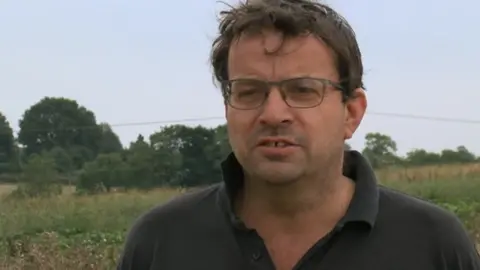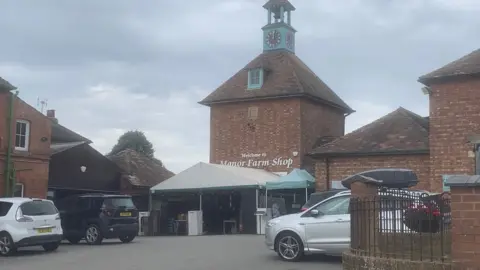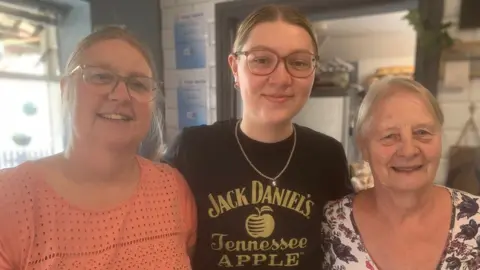Cost-of-living crisis: Energy bills and farmers' health
 BBC
BBCConcerns are growing for the mental health of farmers as the cost-of-living crisis hits their sector. In the Midlands, two rural businesses reveal how they are coping with financial pressures.
"We all thought Covid was the worst thing but actually - when we look back now - Covid was relatively easy to deal with."
Those are the words of farmer Mat Grindal whose 200-acre farm in Lutterworth, Leicestershire, borders the counties of Warwickshire and Northamptonshire.
There are cattle, sheep and a large crop of root vegetables which have withstood this summer's heat and drought conditions. Much of his produce is on sale in the farm shop and restaurant.
"Up until recently, I'd wake up in the morning and think 'is it the children [going to get me up], or checking on the animals'?" he said. "Now, I'm waking up and thinking 'how are we going to pay the electricity bill'?"
His bills are expected to rise by thousands of pounds from next month.
In a bid to save money and protect the jobs of staff, he is seeking to limit the amount of appliances in use at the restaurant.
"Farmers are amazingly adaptable at surviving," he said.
"I think we will get through this. But it is just unprecedented the amount that is being thrown at us."
While the Government's move to limit energy bill rises for all households for two years will help many, farming businesses carry outgoings beyond those faced by domestic energy customers. Some have said they are concerned their additional cost of animal feed, diesel fuel and loss of subsidies will far outweigh any short-term savings in the home.
On Wednesday, the Government announced its "Energy Bill Relief Scheme" for businesses, including price capping, to bring commercial enterprises in line with support for households.

The Department for Environment, Food and Rural Affairs (DEFRA) had previously announced a funding pot to help rural businesses such as farms, wedding venues and pubs.
The Government adds that funding worth £110m will be allocated to help boost productivity and create rural job opportunities. This is in addition, it says, to the £2.6bn allocated via the UK Shared Prosperity Fund (UKSPF) to support levelling up.
How farmers will fare amid the injection of cash is a question asked by support organisations.
Mental health in the farming community is being seriously affected by the cost-of-living crisis, according to one charity.
The Royal Agricultural Benevolent Institution (RABI) has started providing mental health and wellbeing support alongside grants for fuel poverty.
Its latest survey of 15,000 people in rural communities found that 36% of them were "probably or possibly" depressed.
"I think it's tough for everyone right now," said Caron Whaley from RABI. "People are really struggling, [are] in dire straits, and often incredibly anxious about how they're going to meet costs.
"Those anxieties are being exacerbated by the financial concerns of the future," she added.
At a site in Staffordshire, there is a positive outlook.
Three generations of the Brown family say their farming business's energy bills have tripled in recent months. But Jackie Brown, daughter Vanessa and grand daughter Lavinia are keeping things going in Stretton, Burton-upon-Trent, by working with other small producers.
Stables in their former equestrian site have been converted into small retail units. A cheese maker, florist and a wool seller have moved in.
Though they do not split the energy bill, they are combining ideas and promoting each other's trade with the aim of ensuring no one is left behind amid financial pressures.
The family says it is optimistic about the future.
"The smaller these businesses are, the more community will help and support us," said Vanessa Brown.
Her mother added: "We just keep going."


Follow BBC West Midlands on Facebook, Twitter and Instagram. Send your story ideas to: [email protected]
